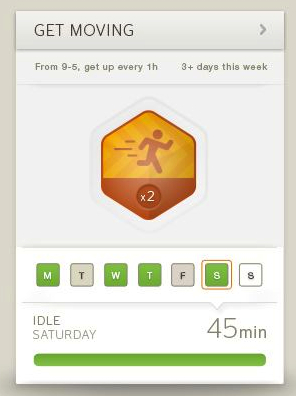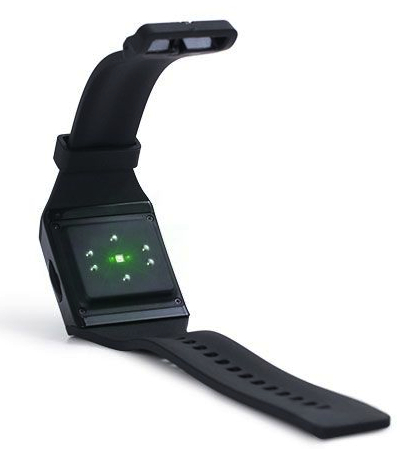 After at least two years of development, Basis Science has officially launched its wrist-worn fitness and health tracker, Basis, for $199, which includes a free, supporting web-based health behavior change platform. The device is available on the company's site and will ship in early December. Basis aims to distinguish itself from the ever growing number of activity tracking devices by focusing on behavior change and healthy habits instead of just the technology.
After at least two years of development, Basis Science has officially launched its wrist-worn fitness and health tracker, Basis, for $199, which includes a free, supporting web-based health behavior change platform. The device is available on the company's site and will ship in early December. Basis aims to distinguish itself from the ever growing number of activity tracking devices by focusing on behavior change and healthy habits instead of just the technology.
"We have been working fast and furious at getting the product ready," Basis CEO Jef Holove told MobiHealthNews. "We concluded that being the best little tracker in a community of trackers was not our goal," he said. "We want to actually help people with their health."
And at $199 Basis Band is entering the market at a higher pricepoint than most other wearable activity monitoring devices.
"We are coming into this as the BMW of the category," Holove said. "That is intentional. Our device is more powerful, more sophisticated, and demonstrably so. We offer more science and more insights, plus the device itself is also customizable [since it comes in a variety of colors] and that helps make it good wearable technology, too. It's good that there are others in this market. It is great that things are starting to take off and proves that there is a market here and that consumers are looking for digital health."
 Basis does pack in an impressive group of sensors: The device includes an optical blood flow monitor, a 3-axis accelerometer, a perspiration sensor, plus skin and ambient temperature sensors. Holove said that "the magic here is not just each individual sensor but how they come together" and that even though the device may have more technology onboard than others, which should help it to drive more insights, he believes users should still ask: 'So what?'
Basis does pack in an impressive group of sensors: The device includes an optical blood flow monitor, a 3-axis accelerometer, a perspiration sensor, plus skin and ambient temperature sensors. Holove said that "the magic here is not just each individual sensor but how they come together" and that even though the device may have more technology onboard than others, which should help it to drive more insights, he believes users should still ask: 'So what?'
The real comparison should be less about the technology differences and more so about the user experience of Basis vs. the competition. Holove said Basis is the only group truly tackling user behavior with a focus on lasting change for health and "that's what matters the most."
Basis offers users more than 10 different "habit cards" that use "baby steps" or little victories to help people form long lasting habits. These steps are meant to be achievable but they get harder as a person progresses through them, Holove said. They are also intended to be things that easily fit into your life as opposed to a workout regimen a fitness magazine might recommend that necessitates going to a gym. Basis combined achievable baby steps with a notion of consistency to encourage users to develop habits to help people fit good habits "into the corners" of their daily lives.
Each habit starts out as a twice-a-week activity and slowly builds. The program automatically adjusts based on the data collected by the Basis device. Progess is also measured on a weekly basis so users get a new start each Monday: "The idea behind this is that we all fall off the wagon and we want to slow down the wagon enough so that it's easy to get back on," Holove said.
One of the habits encourages users to get up and move every hour during the work day. If users are consistently failing to achieve the baby steps that the habit cards are suggesting, the system will suggest the user try a different habit out instead.
 The first iteration of Basis comes with a USB cable that users have to plug into a computer to transfer the device's data. That also tops off the device's battery, which can last anywhere from four days to about a week depending on how the device is being used. Since the optical sensor is frequently taking readings, the wearer's skin tone and hairiness can also effect battery life, Holove said.
The first iteration of Basis comes with a USB cable that users have to plug into a computer to transfer the device's data. That also tops off the device's battery, which can last anywhere from four days to about a week depending on how the device is being used. Since the optical sensor is frequently taking readings, the wearer's skin tone and hairiness can also effect battery life, Holove said.
While Basis will ship as a Bluetooth-ready device, its wireless connectivity will not be of use until the company finishes developing its mobile app. Holove told MobiHealthNews that the company did not want to hold up the device's launch to wait for the app to be finished.
Earlier this year Basis was slapped with a patent infringement lawsuit from competitor BodyMedia. While the lawsuit has not yet been settled, Holove said a preliminary finding from the US Patent Office agreed with Basis that one of the BodyMedia patents in question was not valid because of prior art. The preliminary finding is not a final determination, of course.
In March 2011 Basis raised $9 million in a funding round led by Norwest Venture Partners and Doll Capital Management. The company's advisory board also includes an executive at Facebook as well as the co-founders of RedOctane, co-creators of the Guitar Hero series.
Holove said the Basis device is something that people will want to show off because they are proud to wear it and because it says: "You are doing your part."
"We think of it like putting out recycling bins in front of your house or driving a Prius," he said. "We want this device to be a positive symbol."














